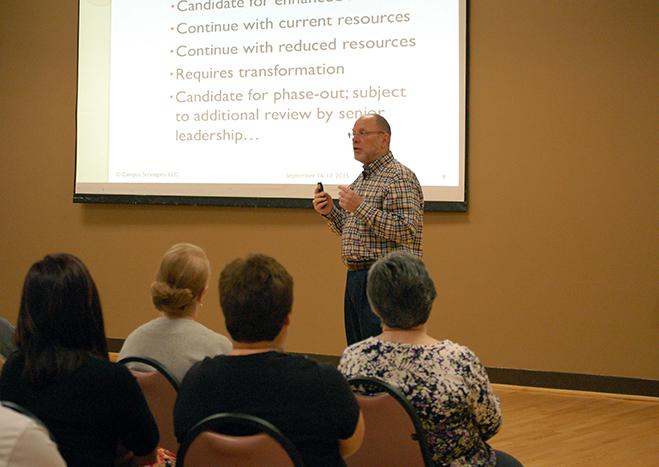Meetings inform campus of restructuring process
Photo credit/ Katlynn Whitaker
Larry Goldstein, founder of Campus Strategies, LLC, speaks to the Marywood community in the Latour Room.
September 20, 2015
On Sept. 16 and 17, Larry Goldstein, founder of Campus Strategies LLC, held three open meetings in the Latour Room in Nazareth Hall to inform members of the Marywood community of the university’s upcoming restructuring process.
The first meeting was held on Wednesday, Sept. 16 from 1 p.m. until 4:30 p.m., and the second and third were held the following day from 8:30 a.m. to noon and from 1 p.m. to 4:30 p.m. Goldstein presented the same session at all three meetings.
According to Goldstein during his presentations, his consulting firm was hired by administration in order to save the university 20 percent of its spending by cutting or directing monies away from under-performing programs, and by selectively diverting the monies to programs that are performing well.
Goldstein said that the money would not be saved by only cutting programs.
“There’s no way you can cut 20 percent of your programs and still be Marywood University,” Goldstein said during the presentations.
In Goldstein’s model, which was based on a similar model created by Robert C. Dickeson, president emeritus of the University of Northern Colorado, universities go through the restructuring process by creating four groups: a coordinating committee to oversee the process, an academic task force and a support task force that will gather data on all of the programs, both academic and support, and a facilitation team that will aid the task forces in gathering data.
Goldstein said that Joseph X. Garvey, vice president of business affairs, and Dr. Alan Levine, vice president of academic affairs, will serve as co-chairs of the coordinating committee.
According to Goldstein, members of faculty and staff can nominate themselves or their peers to become members of the two task forces.
When a member of the audience during the third meeting asked Goldstein if the nominees would then be elected, he responded by saying, “I’m not a fan of elections.”
Instead, members of the task forces will be picked from the list of nominations by Sr. Anne Munley, IHM, Ph.D, president of Marywood University.
This process of restructuring comes amid fears of fiscal irresponsibility on the part of administration, being voiced by faculty, staff, and students.
Dr. Brooke Cannon, president of the Marywood AAUP chapter and psychology professor, questioned Goldstein during the first meeting about starting a restructuring process if there is no trust between the administration and faculty.
Goldstein responded to this question by stating that he does not think this lack of trust is the atmosphere at Marywood.
In an interview, Cannon stated that she does not think the process Goldstein presented during the meeting will be beneficial to the Marywood community.
“I’m concerned that we are unsure how this information will be used for decision-making,” said Cannon. “Decisions will continue to be made as they were. That concerns me.”
Goldstein, however, said he remains hopeful that his system will be able to help the university.
“We know that hundreds of institutions have followed [Dickeson’s] model successfully,” Goldstein said. “And we believe that there are many more that we don’t know about, simply because it’s a ‘how-to book;’ you don’t need to get a consultant to help you.”
According to Goldstein, more information about the restructuring process, including the PowerPoint presentation he used and a recording of the third meeting, will be available on a page dedicated to the process on Marywood’s website that will go live at some point in the near future.
The Wood Word will be investigating the process as it continues.
Correction: Originally, Dickeson was reported to be president emeritus of the University of Colorado. This has been corrected to reflect that he was the president of the University of Northern Colorado.
Contact the writers: [email protected] and [email protected]





